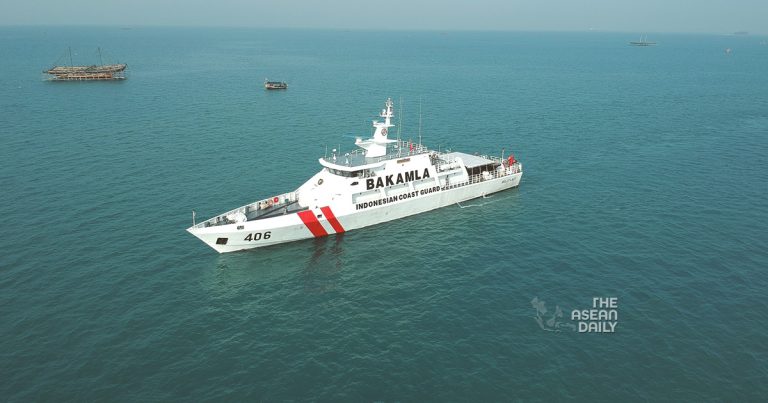5-8-2023 (JAKARTA) Tensions between Indonesia and China in the South China Sea have put the local livelihoods of the Natuna islands at stake. The indigenous fishermen of the region are seeking protection from Chinese encroachment, while the Indonesian government aims to maintain its strong economic ties with its biggest partner.
The North Natuna Sea, often referred to as Indonesia’s front porch, has long been a source of contention for the fishermen who depend on its waters. Foreign vessels, including larger, armed ships, have frequently intruded into their fishing grounds, leading to confrontations and diminishing catches.
Dedi, a 39-year-old fisherman who has been working in these waters for 25 years, expressed his concerns about the competition posed by Vietnamese, Chinese, and Filipino fishermen. Their presence has led to a decline in his catch and earnings. In addition to these foreign fishermen, Indonesian fishermen have also encountered Chinese coast guard boats and warships, creating further tensions.
The Chinese government has been asserting its sovereignty over vast stretches of the South China Sea using the controversial nine-dash line. This territorial claim extends to the Natuna fishing grounds, which are rich in resources and vital for the local fishermen. Chinese coast guard vessels have been spotted in the area multiple times, despite Indonesia’s objections.
Mukhlis, the head of Natuna’s coast guard station, highlighted the recurring nature of these incursions, emphasizing the Chinese vessels’ insistence on their territorial claims. This has compelled the Indonesian coast guard to maintain a presence in the area, deploying warships and coast guard vessels.
A significant standoff between Indonesia and China took place in early 2020, involving fighter jets, warships, and numerous vessels from both countries. Indonesian President Joko Widodo even visited the remote island chain to address the escalating tensions. However, since then, Jakarta’s response to Chinese encroachment has been relatively muted, leading to growing local resentment.
Experts attribute Indonesia’s cautious approach to a delicate balancing act between domestic concerns, emerging geopolitical ambitions, and a longstanding non-aligned foreign policy. The Indonesian government aims to avoid escalating tensions in the Natunas to protect China’s investments in the country.
“Indonesia doesn’t want the situation to heat up because we want China’s investments,” said Yohanes Sulaiman of the University of Jenderal Achmad Yani.
The Natuna islands, part of Indonesia’s Riau Islands province, are home to approximately 80,000 people, most of whom rely on fishing for their livelihoods. The islands fall within Indonesia’s 200-nautical-mile exclusive economic zone (EEZ) designated by the United Nations Convention on the Law of the Sea (UNCLOS). However, China claims the Natunas as part of its traditional fishing rights in the South China Sea, based on its nine-dash line.
In 2021, China reportedly told Indonesia to stop drilling for resources near a gas field in the North Natuna Sea. Indonesian lawmakers said it would not cede sovereignty.
In 2023, Indonesia approved a $3 billion plan for the gas field, shortly after China’s largest coast guard vessel was seen sailing near it.
The intrusions have hurt Natuna fishermen’s incomes. Dedi said his earnings have fallen from hundreds of millions of rupiah monthly to 50 million rupiah now.
ASEAN’s recent agreement with China on guidelines for a South China Sea code of conduct is seen as just “all talk” by Sulaiman. Laos, which chairs ASEAN next, leans more towards China and may reverse gains made by Indonesia this year, experts warn.
Indonesia, as a non-claimant state in the South China Sea dispute, has played a crucial role in mediating conflicts between China and other Southeast Asian nations, including Brunei, Malaysia, the Philippines, and Vietnam. In 2016, an arbitration court in The Hague ruled against China’s claims within the nine-dash line. Indonesia publicly declared that the line overlaps with its EEZ, and President Widodo made a high-profile visit to the Natuna islands to assert Indonesia’s sovereignty.
Despite these assertive actions, Indonesia has been careful not to escalate tensions with China, given its economic interests and desire to maintain a cooperative relationship. The delicate balance between protecting local livelihoods and preserving economic ties will continue to shape Indonesia’s approach to the Natuna islands and the South China Sea.




